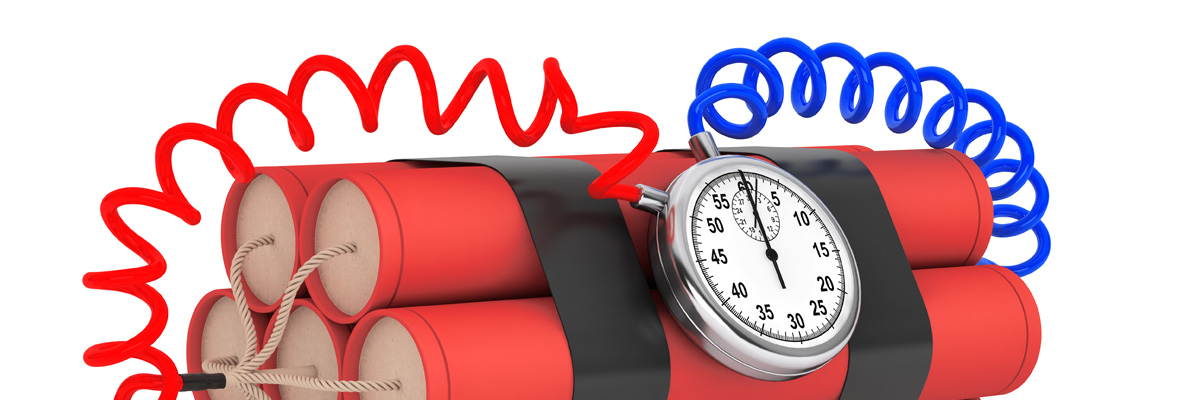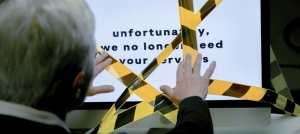Alex Scott
A Survivor's Guide to Employment
Another grim week for unemployment figures.
Not wishing to brag, but I am a leading international expert in the field of unemployment. Not through any God-given talent, best-selling books or insightful research. Simply because I was unemployed no less than seven times in just nine hideous years. See a recent article (read here) to learn about the gory details of how life's slings and arrows left me, once again, unemployed.
So, if you find yourself - sadly like large numbers of others right now - in this utterly miserable situation, I feel your pain. Deeply.
However, I can vouch that the last thing that you need right now is sympathy. Empathy perhaps, but I anticipate what you need most is valuable, practical and straightforward advice. Advice that has been proven to work and can help get you back into work fast.
I thought it may help to condense these learnings into my top ten survival tips for unemployment. In short, how to hold it all together and ultimately bounce back quicker and stronger.
Survival tip 10: Accept the result
As they say at every self-respecting alcohol and addiction clinic - or in my case psychiatric ward - until you 'accept' the reality that you have a problem or condition, you have no chance of addressing said problem.
This 'Accept The Result' principle applies to job loss too, regardless no matter how unjust the manner of your departure. In my case, no less than three of my dramatic exits were at the peak of the most productive and successful periods in my entire career. Hard to believe - let alone accept - but a combination of ego, hubris and Founder's Syndrome (Google it) led to my sudden and gut-wrenching departures when I was right at the top of my game. While every ounce of my soul - and many of my stunned colleagues - urged me to fight these decisions, I learned from bitter experience to move on and swallow the pill, no matter how bitter the taste.
Survival tip 9: Put your oxygen mask on first
I still vividly remember - in those heady days when you could actually fly in aeroplanes - reading the safety instruction for parents: "In the event of an emergency, put your own oxygen mask on first, before attending to your children". My initial reaction - as someone fairly new to the parenting game - was that this instruction was at best baffling and at worse life-threatening to my most treasured possessions. Once the penny finally dropped, it made all the sense in the world and is a perfect analogy for that moment when you find out that you are now officially unemployed.
Bottom line, unemployment is purgatory but don't make it any worse on yourself by forgetting the fundamentals about looking after number one. Skipping the exercise routine, throwing the (relatively) balanced diet out of the window or hitting the proverbial bottle a little too hard are all rebound inhibitors. Trust me I've got all three t-shirts in multiple colours. Getting yourself back in the game - and fast - is the number one priority for your family. So in a nutshell, put yourself first. Be more selfish.
Survival tip 8: Batten down the hatches
One of the scariest statistics I recall about unemployment was that the average time 'out of work' for corporate management was 211 days. Yup, you read that right. And that stat was at a time of low unemployment when global pandemics were contained to the fiction section of Blockbuster Video or your local library.
When it comes to financial planning for unemployment, beware of 'boosterism', undue optimism or downright wishful thinking. I majored in all three. While staying upbeat is absolutely critical for your chances of actually landing a new role, plan for the worse case financially.
Job number one - before even looking for a job - is to batten down the financial hatches. Plan financially to be out of work for at least a year and stop every single discretionary spend in the family immediately. Out goes the Netflix subscription, monthly fruit boxes and evenings out at your local Chinese. There will be weeping and gnashing of teeth from loved ones no doubt, but suck it up. Until you get a job, non-essential spending is banned for the whole family. It sure beats foreclosure.
Survival tip 7: Friends are not always friends
The single biggest surprise to me when I lost my job the first time was this: it's not always the people that you expect to help you most who actually do. You are now, after all, damaged goods. Indeed, counterintuitively I found that while several of my closest former business friends dropped me like a hot potato, some people that I didn't know that well opened countless invaluable doors. For managers and above, you will almost certainly find a new job through your network - albeit quite possibly from the last person that you expected.
Survival tip 6: Recruiters don't work for you
Another big 'aha moment' from my unemployment journey was that recruiters don't actually work for you. Who knew? Call me deeply naive, but after 23 years of gainful employment, I assumed these hot-shot recruiters would be on my side, representing me and helping me get a job.
Apparently not. Their job is to find a fit for the client roles that they are handling and the more progressive recruiters may even consider specific future roles. If you fail to fit either criterion, you are worthless to them. Get over it. There is no place for pride after a fall.
Survival tip 5: Give before you get
If you are going to approach people in your own network - which is an absolute imperative - think about what you can do to help them first.
We've all been there. With the best will in the world, a former employee or colleague contacts you and explains that they have recently joined the 'club' and could you help them find a job. That's it. The onus is now on you to do their leg work and help them with their job search when you are already exceptionally busy and frankly clinging on for dear life to your own job.
However, what about if they had offered to help you in some small way - using their own transferrable talents or perhaps to make a meaningful connection - well then you have a totally different scenario. So yes, for every contact that you are considering asking to help you with your search, first think how you can give before you get.
Survival tip 4: Cold applications bring cold comfort
If you are new to this whole jobless malarkey and mid-career, you may well be tempted to jump online, do a little browsing, find a (sort of) suitable job vacancy and lob in your CV 'cold', with little more than a wing and a prayer.
Spare yourself the effort and go for a nice walk in the park or dip in a river. 99 times out 100, you won't even get in the pile.
Forget the cold-call model and find a select few 'warm' opportunities with prospective companies where you may have a good contact. An angle to get your CV or resume into the pile, preferably towards the top. Find that angle and improve your odds. Exponentially, after all, it's not what you know... Of my own seven job offers, not one came from a cold application.
Now, this advice might seem obviously directed to those newly unemployed in middle to senior management - but that's misleading. Even if you are starting out or still at an early stage in your career, you need to make those applications and tap your network as well. It's much bigger than you think.
Survival tip 3: Sell yourself
Job hunting = SALES. If you don't like sales or don’t see yourself as a salesperson, get over it. No one else is going to be selling you - perhaps they may open a door or help get your CV in the pile - but only you can actually make the sale.
Unlike Del-Boy flogging his 'silver' spoons, this is a high-level consultative sales project. A nuanced, mutually beneficial transaction. But still a sale. Forget the standard CV and covering letter; both need to be tailored perfectly to the prospective employer - along with a portfolio and your personal branding - to ensure you stand out from the crowd.
When it comes to the interview process you need to know everything there is to (legally) know about your interviewers to create that all-important initial connection. A friend, football team, pastime or university in common, it doesn't matter what, just find it. Fortunately, LinkedIn is the gift from the Gods for this underrated detective work.
In conclusion, when it comes to getting a job you need to sell yourself as if the rest of your life depends on it. Because frankly, it does.
Survival tip 2: Hungry like the wolf
My penultimate tip comes from my extensive experience as a hiring manager. Over the last three decades, I have hired hundreds of incredible people in wide-ranging roles, from pub landlords in Tottenham to sales executives in corporate America. Ultimately, all things being equal in talent and qualifications with a couple of candidates on a final shortlist, my final decision is invariably based on one deciding factor.
Who wants it most? Who essentially is the hungriest?
Who has done the most rigorous homework, taken the time to truly understand our needs, bothered to learn the name of the receptionist and tailored their pitch exactly for the role? Ultimately, if a candidate moves mountains to get the job, imagine the tectonic impact they could generate in the role.
Survival tip 1: Ink on the page
The final tip is the simplest tip of all. The race is not over until ink is on the page. I have lost count of the number of verbal offers I received during this torrid phase that ultimately fell at the last fence. The ultimate objective for a job search is to garner a written offer for a job that meets your needs and with an organisation that matches your values. Once both parties have signed in ink, then and only then can you remove your oxygen mask, hug your family and take a deep and very well-earned sigh of relief. You, my friend are back in the game.
James Fellowes is the co-founder of BRIDGEOFHOPE.CAREERS, the missing link between charities with 'untapped talent' and inclusive employers seeking to expand their talent pool.
[email protected]
A version of this article was originally published in January 2021 on LinkedIn.
Job Seeking?
Is the way employers see you getting in the way of work?
Perhaps you graduated or left school – or got made redundant from your first job – in the middle of the pandemic. Maybe you worked for decades, took redundancy in your fifties and now can’t get started again.
Do you have a physical or learning disability? No fixed address? Does your CV have a career gap caused by something in your past – mental health problems, a prison sentence, a period of military service, or even just family time – that’s difficult to present positively on your application? Or have you just stumbled into old-fashioned racism?
You’re not alone
There are many tens of thousands of people just like you who find themselves on the margins in the job market. We think that’s wrong. People like you are often among the most resilient, capable, creative and loyal employees going, given the opportunity.
We built BRIDGEOFHOPE.CAREERS as a portal to help people like you get into / back into the workplace. And we’ve partnered with a rapidly growing number of major companies who understand that having a truly diverse and inclusive workforce is an asset, not a liability. Companies like Direct Line, Voyage Care and Santander go out of their way to advertise their vacancies on our portal.
Why?
Because they know they will get candidates from a much broader range of backgrounds and experiences than they might otherwise attract.
And that’s what they want.
People like you.
Your first steps on the portal
Of course, getting into regular work for the first time – or the first time in a while – can be daunting. That’s why a range of local and national charities have become Bridge of Hope referral partners, helping candidates get job-ready with smart CVs and confident interview technique. If you're already working with The Prince's Trust, Walking with the Wounded, Mind, St Mungo’s, Centrepoint, or one of our many other charity partners, they've promised us they won't sign you up until you’re ready for employment.
Even then, you’re not on your own: many of them can continue supporting you for your first year back in work. Ask your charity support worker (if you have one) if that’s something they can do for you. Or get them to talk to us!
Whether you’re applying with the support of a charity, or you’ve found us on your own, the process is the same. Register at BRIDGEOFHOPE.CAREERS, upload your CV, and we’ll start sending you work opportunities that match your skills, interests and location. And you can apply with confidence, knowing that you'll be assessed purely on the strengths of your knowledge, experience and skills, not on how you look or complications in your past.
Prison-leavers need a chance to become 'Returning Citizens'
I once looked back at my life and wondered if I even got a first chance let alone in need of a second one.
My life started in a family where my father didn’t think I was his biological son. I experienced both physical and mental abuse throughout my childhood. I felt a lack of significance at home which left me wide open to other influences. I found significance in the street where my life changed further for the worst.
After losing my sister to cancer, I had a mental breakdown which led to heavy use of drugs and alcohol. I lived my life so recklessly that before I knew it, it had spiralled out of control and I woke up one day in a prison cell, with a spell of time inside ahead of me.
A prison sentence is as rehabilitative as you’re prepared to make it – and I came to my senses inside, determined to become the person I was always meant to be. I invested my time equally in university-level education, therapy to deal with childhood trauma, and personal development. It took time, but it led me towards more pro-social attitudes with confidence, and a beautiful shift in values.
After almost four years in therapy, I sat at the end of my bed with tears rolling uncontrollably down my face. They were tears of joy because for the first time in my life I felt free. Free from emotional discombobulation and pain; free from self-loathing and lost confidence. I felt transformed and knew that I was going to become a remarkable person. Could you imagine what that might have felt like?
I left that place a while ago with better mental health, hope, and determination, and with much gratitude for the organisations that had helped to set me on this new path.
Bounce Back, for example, is a charity that trains prisoners in construction skills so that they have a legitimate trade to work with when they leave prison. I chose painting and decorating even though I didn’t like it. They soon found out that I wanted to set up my own business in modular construction, which was outside their normal area. But they were unfazed and connected me with Resume Foundation whose business start-up programme gave me the grounding I needed to become an entrepreneur. I am now a proud ambassador for Bounce Back who have become great friends of mine.
During my time away, I also encountered Key4Life who helped me to build more confidence and unlock more of my childhood pain through equine therapy. Working with horses has made me a patient mentor which has been valuable as I am now mentoring several remarkable young men. Through Key4Life I was introduced to Ruebik for which I am grateful for simply being brilliant and inspiring when I later launched my business.

When I finally stepped out through the prison gates after too many years, I wondered – was this my second chance? Looking back at my childhood, I think maybe it was finally my first chance and I’m making the most of it. It feels like my life has only just begun and I’m happy with ‘better late than never’.
There is a reason why marginalised individuals are incredible in healthy, progressive environments. It’s because life has taken our motivation away and replaced it with determination. Individuals with determination do not need to be motivated, therefore you get a self-sustained and consistent individual on your team.
I have continued to live my life remarkably and with my renewed purpose, in the memory of my sister. Plans change, of course – my dream of a modular construction company became a different dream, for a community-focused health and wellbeing brand, Troothshop, which traded successfully for a while and is currently on hiatus. But the team behind Resume Foundation, which supported me into self-employment, also saw my potential and took me on as the Partnerships Manager for their other enterprise, Prosper4 Group, which runs BRIDGEOFHOPE.CAREERS.
My role here allows me the chance to channel support towards individuals like myself, but also to support the same organisations which supported me and them on our journeys of personal development. I now help over 80 charities support their ‘untapped talent’ back into meaningful employment – two of which have supported me on my journey.
Today my work is about inclusivity, and finally the world is waking up to the potential unlocked by having an inclusive team. With Bridge Of Hope, we are unleashing the hidden potential in some of the most resilient and determined individuals who have suffered and struggled with barriers from disability to discrimination.

I’ve got plenty of experience of discrimination; I’m black, over 50, with a disability and the stigma of being called an ex-offender. In my heart, I am not an ex-offender. With the work I put in on rehabilitation and personal development I feel more like a 'Returning Citizen' than anything else. I have finally become the person I was always meant to be. My life is now dedicated to supporting others and creating pathways for goodness, equality and aspiration.
It is determination that keeps us knocking at the doors. It’s time to let the rest of our human family into the arena of equal opportunity. It’s time to realise that, as Maya Angelou puts it, “We are more alike, my friends, than we are unalike.”
Do you have marginalised talent seeking employers who want them? Check out the BridgeOfHope.Careers Portal and join us in growing an inclusive culture.
Feel free to email me: [email protected]
Why Inclusive Recruitment?
Everyone deserves the chance of a job. Why? Because unemployment sucks.
Take it from an expert.
I was born lucky. I was born into the ‘lucky sperm club', living a gilded youth thanks to a whole drawer-full of silver spoons. I was sent to 'that school' (yup, that one) in the same gambling ring as ‘Dave’ and a few years below a polar bear of a boy called Boris. Don't judge me; my parents chose it. Mine was a charmed existence, with untold access to opportunity and a 'fast track' career pathway mapped out for life.
That is until 3 pm on April 16th, 2009, when my senior sales-executive role in the US was made redundant.

I was suddenly unemployed. Jobless. Wholly unoccupied.
But unemployment was something that happened to 'other people'. People who maybe didn’t work as hard as me, people who perhaps weren’t as good at their jobs as me - or God forbid - people who had screwed up. Bottom line, after 23 years of upward career mobility and continuous employment – for global leaders in the hospitality and drinks industries respectively - life was good, and unemployment was somebody else’s problem.
Then the music stopped and there was no chair left for me. The fact that I had been made redundant only as a result of the 'Great Recession' was irrelevant. Suddenly, in the length of a three-minute telephone call, my cherished professional status went into freefall. I was no longer in the fast lane; I could forget about being a corporate player. Just like that, I had a new alter ego: loser, failure.
I was utterly consumed by an appalling, visceral sense of shame. I had catastrophically failed my own beloved family - the people I loved most and the children who depended on me.
As anyone who has been out of work can attest - and there have been plenty more of those in the pandemic - there are zero redeeming features to unemployment. Forget the hackneyed clichés about spending quality time with your family or using the precious newfound weeks as a chance to learn new skills. That - as we Brits like to say - is bollocks.
It's not a blessing in disguise - it's a ticking time bomb. Your Mission (almost) Impossible – find a new job in a role that appeals, offering the right compensation, in a company that suits, at a location that works. And all before the ticking stops.

And unemployment can quickly unravel your prospects of getting re-employed. Losing my job was like a tsunami, trashing my self-worth and obliterating my self-confidence. Depression hit - uncharted territory to an unswerving optimist like me. Suddenly, people crossed the street to avoid awkward conversations or talked in muted tones when I entered the room. Or was I just being paranoid? The sleepless nights, the miserable rewriting of CVs, the uncaring recruiters avoiding my ever-more desperate calls, and above all the soul-sucking cycle of rejection after rejection. When I looked in the mirror, I could hardly recognise my haunted reflection. Was I simply unemployable?
It turns out that I wasn’t. But the second job ended in redundancy just like the first and dropped me right back into the same bleak abyss. At times, life felt like a petrifying street fight against Mike Tyson packing a large baseball bat and a grudge. It wasn't just a job search; this was a fight for the survival of everything that mattered to me.
I needed to find reserves of resilience and strength that I never knew existed. Failure was simply not an option. My rallying cry to myself: dig deep; dig deeper than ever before. Never let go of hope. Never, ever give up. And above all, stay in the fight. After all, it takes just ONE punch.
And then, out of the blue it happened. An astonished Tyson hit the cobbles. An actual job offer! Gainful employment. Miracles of miracles, an exciting new role before the proverbial clock stopped ticking. Someone actually believed in ME!
The sheer unadulterated ecstasy, giddy euphoria, the newfound bounce in my step and above all the utter and total relief! I was BACK!
Just not for long. In the next few years, I repeated the same cycle again and again. Several more redundancies, one excruciating firing, the agony of two so-near-and-yet-so-far entrepreneurial ventures and finally one medical discharge thanks to a doozy of a nervous breakdown on the garden porch.
I was in the grip of an unimaginable nightmare, triggered by a potent cocktail of serial redundancy, a couple of swindlers, numerous sociopaths and topped off, it turned out, by undiagnosed bipolar disorder. It's a condition that I now see as a huge competitive advantage – but at the time it was enough to get me sectioned and trigger a cataclysmic life collapse.
After a brief sojourn in a charming psychiatric ward outside New York city, I returned to the UK. It was 2015 and I was alone, having lost everything I valued.
As a white, (formerly) married, middle-class male, job discrimination was an unfamiliar shock. But suddenly there it was, gratuitously staring me in the eye. I was too old, I was overqualified, and since I had a mental health condition, I was likely to start drooling on the carpet at any moment. Not that any of these reasons were ever given, just implied.
Was this what it felt like to be born on the ‘wrong side of the track’, to have the 'wrong' coloured skin, ‘wrong’ religion, to talk or behave in the 'wrong' way? How it felt to have your actual talent and capability rendered irrelevant by accident of identity or history?

I took the only job I could get within biking range of my mother's cottage in Suffolk: assistant cleaner in the frozen meat division of a local food processing plant. It was a zero-hour contract for minimum wage and performed at a numbingly cold minus-50 degrees. The extensive health & safety guidance amounted to this: if or when your eyelids froze up, get the hell out quick before hypothermia kicks in. It had been a mighty fall, but it was paid work and I stuck it out for five long, frigid months until an opportunity to get back on the ‘career ladder’- naturally several rungs lower - finally arrived.
This was an opportunity to regroup, rebuild and reassess. It meant that I was prepared in March 2018, when I was made redundant once more, and unemployed for the seventh time in a decade. This time I decided to ‘exit right’ from the corporate world once and for all; to move to the non-profit sector to try to 'change the world' and ideally give new hope to others.
How? I had no clue; although helping people find access to employment and regain hope was certainly going to play a central role. That much I did know.
And why? Because if there was one thing I knew, it was this: a job provides for your family, a job nourishes your self-worth; a job is hope in a bottle, rocket-fuel for the soul. A job changes everything. Everyone deserves the chance to have one.
Oh, and because unemployment sucks.
Take it from an expert.
Career Changes can come at a cost
A poll of 4,000 workers, by leading insurer Aviva, found that three in five employees planned to make career changes, ranging from a job switch to learning a new skill – a seven percentage point increase since July 2020.
Aviva’s research also found that while young people were most likely to make the change (87% said they were now re-evaluating their careers), it was those aged between 25 and 34 who were most likely to want to retrain or pursue a different career.
Those that have, unfortunately, lost their job in the last year may be looking to reskill out of necessity; however, for those who retained their jobs, working-from-home and the pandemic experience has provided them with the opportunity to seriously reflect on their career.
We will soon discover whether this change in thinking has brought about a real dislocation in the job market or not. Still, for both employees and employers, this sparks some interesting questions.
Should an employee still earn a London salary if they are no longer commuting and spending time in London? Working-from-home may provide more opportunities to spend time with family and local friends, but is it healthy for workplace bonhomie to be perennially away from your colleagues? Can new staff ever really be part of a team if they never meet in-person? Non-verbal communication at meetings and interpersonal dynamics (the so-called ‘water-cooler’ moments) can all contribute to a positive work experience and higher productivity at work.
Among OECD countries, Britain has often reported the second highest working hours amongst rich countries (after the US) but, at the same time, lags behind in productivity growth. Essentially, fundamental changes in work culture may help change this. Greater flexibility in our approach to work, for example, also benefits those from underrepresented communities with certain disabilities or other responsibilities (e.g. those with physical disabilities may prefer working-from-home over a daily commute). Hence, while the pandemic may be behind us, the questions it raises should stay at the forefront.
Young people hit hardest by Covid redundancies
They make up two-thirds of the workers laid off during Pandemic.
It’s a tough time to be young. The latest ONS figures show that the UK unemployment rate was estimated at 4.7%, 0.8 percentage points higher than before the pandemic, but 0.3 percentage points lower than the previous quarter. Redundancies, too, have now returned to pre-pandemic levels. Despite these positive trends, the brunt of layoffs during the pandemic was most acutely felt by people aged 16 to 24 years old. The ONS’s Labour Market Overview shows under-25s made up nearly two-thirds of the fall in paid employment since February 2020. In other words, more than 60% of the 693,000 payroll employees that lost their jobs were young people. Add to that freelancers and occasional workers, and the picture is even more grim. There are fears the furlough scheme, in place until September, is masking the true extent of the damage to young people’s employment prospects.
The situation has improved marginally in the last year and is likely to improve further in the coming quarter, but employment will remain at least four percentage points lower in July 2021 compared to pre-pandemic levels.
The disproportionate impact on this age group is likely because they are overrepresented in the sectors hardest hit by the pandemic: hospitality and leisure. Two challenges unique to this demographic stand out. According to global business consultancy McKinsey & Company, artificial intelligence, automation, and robotics will dramatically change the nature of work in the coming years. Older workers boast of some skills that protect them against the most aggressive changes, including pre-existing networks, communication skills and a greater business understanding. Young people often lack these and are more vulnerable. Furthermore, despite a significant deterioration in the quality of the college experience for students (including no in-person contact with tutors, no ‘university life’ or in-person job fairs), British universities have not offered fee reductions to students over the last year. Students entering a post-covid labour market are, therefore, immediately disadvantaged in balancing unabated university fees, despite a deterioration in quality, with fewer job prospects and intense competition.
The government has, however, implemented some incentives for businesses to hire young professionals. For example, the apprenticeship and Kickstart schemes are designed to encourage organisations to employ 16-to-24 year-olds. Simultaneously, employers should also consider offering volunteering and work experience opportunities.
At Bridge of Hope, one of our focus areas has been helping young people, especially from underrepresented communities, into the job market. Closely monitoring such trends in the labour market (the toughest in a decade), we recognise the urgent need to support vulnerable sections of society. Understanding the unique needs of the communities we work with, we actively engage diverse and inclusive employers who align with our priorities and are able to offer sustainable employment opportunities.
These are just some of the ways we are building the Bridge of Hope.
A Post-Covid Jobs Market Looks Very Different
The nature of recruitment in Britain is changing. It has always been tricky, but even more so during the last year with remote working forcing the move to near-ubiquitous virtual hiring. According to HR News , this has meant 57% of hiring managers think that hires they have made in the past year have not worked out to some extent.
Britain has just come out of the worst economic downturn in 300 years, marked by a 9.9% fall in GDP last year. The economy is expected to expand by 7.25% in 2021, with extra government spending helping to limit job losses.
This has meant a significant uptick in the demand for staff, as well as increased pay. According to a new survey by professional services firm KPMG and the Recruitment & Employment Confederation (REC), the Midlands recorded by far the sharpest increase in billings for temp jobs, with the softest growth in London.
It found that in the private sector, permanent vacancies increased at their quickest pace in nearly three years, while growth in short-term positions was highest since September 2018. The steepest expansions in permanent vacancies were seen in Nursing/Medical/Care and IT & Computing. Retail was the only sector to register a decline.
Data from other industry bodies and firms support this robust growth. Domino's Pizza is hiring 5,000 cooks and delivery drivers, as staff who joined during the pandemic head back to their old jobs.
Recently, UK Hospitality said there was a shortfall of about 188,000 workers in the hospitality sector, or a 9% vacancy rate, with the shortage of front-of-house staff and chefs being particularly acute. Figures suggest that roughly one in ten staff hospitality workers left the industry in the past year, as a result of the pandemic and Brexit.
With the average cost of hiring a new employee reaching £3,000 according to Glassdoor, recruitment is something businesses cannot afford to get wrong. That’s why with hospitality re-opening, UK Hospitality announced it will be running sessions in partnership with Jobcentre Plus work coaches in every region of England, as well as across Scotland and Wales.
HR News’ research found that 37% of UK businesses say that Brexit is a big influence on their hiring and skills strategy. Costs of hiring from the EU include sponsorship licensing, immigration and government fees, as well as use of the NHS, which could cost an employer up to £10,000 over five years.
With these hiring headaches, it is easy for other parameters to drift, such as ensuring you are hiring a diverse team to reflect your customers. At Bridge of Hope, we spend a lot of time talking to inclusive employers for whom Diversity & Inclusion is foremost in their thinking. They tell us that while focusing on addressing some of the macro challenges highlighted above, BAME communities, those with disabilities and other underrepresented communities sometimes get overlooked.
The “2021: Mind the trust gap” report surveyed 500 senior hiring managers and recruiters in the UK and found 39% are having difficulties with candidate differentiation, while an overwhelming 77% see bias or a lack of diversity in their current hiring processes as a significant to moderate challenge.
We see businesses tackling these challenges head-on. Bupa UK’s Workplace Wellbeing Census 2021, a study of more than 4,000 employees across 13 key sectors, conducted by YouGov, found UK organisations have made marked efforts to safeguard the wellbeing of their workforces over the past 12 months. One in seven (14%) introduced policies to ensure diversity and inclusion. 68% of those with a disability reported that working from home over the last year has removed accessibility issues previously faced when going to a physical workplace every day.
There is an untapped talent pool out there that Bridge of Hope helps employers access. Underrepresentation affects a range of communities, whether it is based on gender, race, physical or mental capability, criminal record or other factors. As the economy enjoys its fastest growth in more than 70 years, the nature of recruitment is changing. If you are a job-seeker or an inclusive employer, this is good news.
Don't Stop at Plan A
Life doesn’t always go according to plan - that’s why you need a plan.
Today, Craig Dyer is the successful founder of Plan C Group, a collection of companies including an independent record label (Plan C Records), an event management and promotion company (Plan C Promotions) and a social enterprise (Plan Change).
But how did he get here and what happened to Plan A and B?
Growing up in a single-parent household in Brixton, Craig had a normal childhood with a loving mother supporting him. From an early age, Craig saw his mother work hard- hustle- to provide a better life for Craig, through balancing multiple jobs and studying full-time. That, however, is the hard route and there are easier options to make money quickly.
A life of crime and drugs is a lucrative business and, on a good day, Craig could bring home £1800 running what resembled a legitimate business. Indeed, youth, the rush of quick money and access to endless luxuries are irresistible. They make you feel ‘untouchable’, as Craig put it. However, the long arm of the law is always lurking and soon enough Craig was arrested by the police for possession of a firearm. Plan A had failed.
In prison, with a lot of time to reflect, Craig would often think about his mother and her reaction to his arrest. She was devasted, heartbroken and frustrated, but still eager to help her son. She found Craig an excellent solicitor, who then reached out to a Barrister. What all three people here have in common is their desire to help Craig. This was a pivotal moment because it reignited hope, it affirmed that he had potential and qualities worth fighting for.
This realisation helped Craig during his time in Glen Parva Prison. He realised that the skills he developed were not unlike those needed to run a corporation. The next step would be to apply this knowledge to build a new empire.
Plan C is meant to help build this empire- a legacy rather. Taking inspiration from John D Rockefeller, Jamsetji Tata and Mayer Amschel Rothschild, Craig was determined to turn his life around and earn an honest living. Upon release from prison, several factors catalysed Craig’s transition to the right path: the birth of his daughter and the decision of his close friend, Ash, to quit the business. The realisation that family is everything changed Craig's outlook and helped put things into perspective. Plan C was beginning to take off.
Craig got a night job at Tesco and, although he was earning less, made an honest living. He set goals: get a diploma in Business Retailing, be promoted to Manager at Tesco, get a promotion and buy a council flat. After successfully completing this first five-year plan, Craig’s next ambition was to create a business and work for himself. Music played a huge role in his entrepreneurial drive and this is where he found inspiration for his next hustle. While he was committed to plans, he saw that others in the creative industry lacked direction. This was his first revenue stream: create a structure and a plan for artists to allow them to focus on creating content- enter Plan C Records. Plan C Promotions and Plan Change soon followed.
Craig realised that the reason he had these opportunities was because of the support of his friends and family. In fact, it would have been easy to re-offend and go back to prison without this. On his journey to prosperity, and expanding Plan C Group, Craig joined Project ReMake, an initiative by Resume Foundation, which helped connect him to a lot of people including executives from Warner Music, M & C Saatchi and Andrew Leslau. Numerous doors were now open for Craig.
By not stopping at Plan A and persevering, Craig has turned his life around. Today, he is determined to help those in prison achieve the same. He wanted to be the support system that gives others hope
New to Bridge of Hope? Start here.
We’re delighted to share our brand new video, with our brand new logo, on our brand new website!
Our brand new website is here, thanks to the excellent work of our industry-leading partners at Alvius.
As we’ve been redeveloping our website, we consulted with a range of our registered candidates and potential new users. You told us how easy the site was to use, and how trustworthy you found it as a source of employment information – and don’t worry, none of that’s changed.
But a few of you – often job seekers taking tentative first steps into the online jobs market – told us you’d like a bit more information about who we are and how the site works. So, as we redeveloped the site, we wrote a new page to welcome candidates, and a video to illustrate how the site works and what we can do. Here it is.
The video was written and directed by David McAllister, and designed and animated by Nikhil Mistry for Prosper4.
This article and video were updated on February 7 2022 to reflect site developments since April 2021.
Four months of rapid growth as a Nesta semi-finalist
The Rapid Recovery Challenge has funded progress at pace.
The Bridge of Hope has reached more new candidates and employers than even our most hopeful projections, in the four months since Nesta made us one of their Rapid Recovery Challenge semi-finalists.
This week, we reached 40,000 registered candidates on our site. They can view over 30,000 live jobs from inclusive employers every day, and have been making 8,000 applications a month.
Thanks to the efforts of our sales and recruitment teams, and our hard-working ‘tech stack’, we have smashed our targets. More than that, while exact figures are impossible to track, we estimate that over 80 of our candidates will have found long-term employment as a result of using BRIDGEOFHOPE.CAREERS, including around 60 candidates of the type targeted directly by Nesta.
How we spent the investment
Nesta is the UK’s innovation agency for social good, and last December it gave Bridge of Hope and 13 other 14 organisations £125,000 each to invest in new tools and services that improve people’s access to employment and money across the UK. They were particularly focused on those most affected by the Covid economic crash: 16-to-24 year-olds, people on low incomes, and people in insecure roles like zero-hours or part-time contracts.
BRIDGEOFHOPE.CAREERSwas already growing, thanks to funding from Innovate UK, but our successful Nesta bid allowed us to pick up the pace and spend more on upgrading the technology. That includes redesigning the look and feel of the portal itself to make it more user-friendly and accessible (launching mid-April), following consultation with some of our candidates. We’ve also been able to get support service contracts in place more rapidly to support our growth, invested in marketing (including a growing presence on social media) and hired more people to engage directly with inclusive employers and hard-working charities and agencies.
In particular, we’re intent on signing up enough major employers through our disruptive subscription model that we can make the careers portal self-financing in the long-term, rather than depending on investment from bodies like Nesta and Innovate, welcome as they are. Any excess revenues will then be shared among our referral partners.
Success breeds success
The more employers we bring on board, the more others want to join in, and the more jobs we have posted, the more referral partners and self-referring candidates want to sign up to find meaningful work.
We’ve also learned a lot, including the importance of being able to track successful outcomes more successfully than the technology will allow at the moment. We’re currently exploring how we can do that more reliably in the future.
Working with Nesta has been a rare privilege. For one thing, we’ve benefited from the expertise of their partners, like JP Morgan Chase, Deloitte, McKinsey and Co and others, who are standard-bearers for improving access to employment and finance. We’ve also established new relationships with some of Nesta’s other semi-finalists, including City & Guilds, Sort Your Future and Springboard. These alliances in turn mean our referral partners can help their service users get job-ready more quickly and effectively, which will bring them to the job market – and our portal – more quickly too.
With these collaborative partnerships in place, our long-term goal is to make BRIDGEOFHOPE.CAREERS a truly integrated careers portal: a place where people can get career advice and training, and register for courses to support their employment needs, as well as search for and find jobs.
Next week, we’ll learn whether we’ve been one of the six semi-finalists to win a further grant and proceed to the final round of investment. We count ourselves in rare and special company to have come this far, and we wish the other applicants every success. Whether we advance with Nesta or not, we look forward to continuing to work with our new partners to help more marginalised people get into meaningful employment with progressive and inclusive employers.
Because that’s what it’s all about.
For more information about working withBRIDGEOFHOPE.CAREERS, whether as a funder, employer or referral partner, please do get in touch.









